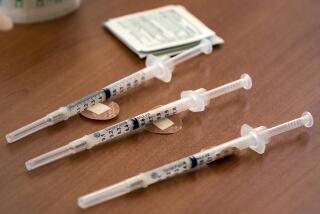VaxGen Slammed as Investment Cut
- Share via
Shares of VaxGen Inc., a tiny Northern California biotechnology company racing to develop the first successful AIDS vaccine, plummeted Friday after billionaire Paul Allen revealed that he had reduced his once-substantial stake to less than 5%.
Allen’s smaller stake added to speculation that VaxGen’s experimental vaccine doesn’t protect users from the fatal disease. But Jim Key, a company spokesman, said results of a closely watched drug trial, which ended in December, aren’t yet known.
VaxGen’s shares fell $2.89, or 17%, to $14.09 on Nasdaq.
Data from the trial are secret, known only to a few VaxGen employees and outside experts who are analyzing it. The company expects to announce the results by the end of March.
Speculation about the outcome of the vaccine trial has gyrated VaxGen’s shares for months. It hit a 52-week high of $23.25 in December, rising from a low of $4.81 in July.
Jonathan Moreland, research director of InsiderInsights.com, said Allen’s move represented a red flag for investors. Allen’s stake in VaxGen has dropped to 4.6%, from 16.5% in April.
“It is natural for insiders to sell out after a stock has done well, and VaxGen certainly has,” Mooreland said. “But the timing wouldn’t make me feel comfortable. If the smart money is selling out, it makes you think all the potential upside was already factored into the stock.”
A spokesman for Vulcan Ventures, Allen’s investment vehicle, declined to comment.
The vaccine is a genetically engineered copy of a molecule found on the surface of HIV, or the human immunodeficiency virus, which causes AIDS. VaxGen scientists hope the vaccine will train the immune systems of people who receive it to recognize the AIDS virus and destroy it before it makes them ill.
The three-year trial involved 5,400 people -- mostly gay men in the United States -- considered to be at risk of contracting AIDS. Two-thirds of participants received the vaccine, given in a series of seven shots, and the rest were injected with a placebo.
The Food and Drug Administration has indicated it would consider approving a vaccine that protects just 30% of the people who receive it, VaxGen said in a government filing.
More to Read
Inside the business of entertainment
The Wide Shot brings you news, analysis and insights on everything from streaming wars to production — and what it all means for the future.
You may occasionally receive promotional content from the Los Angeles Times.










